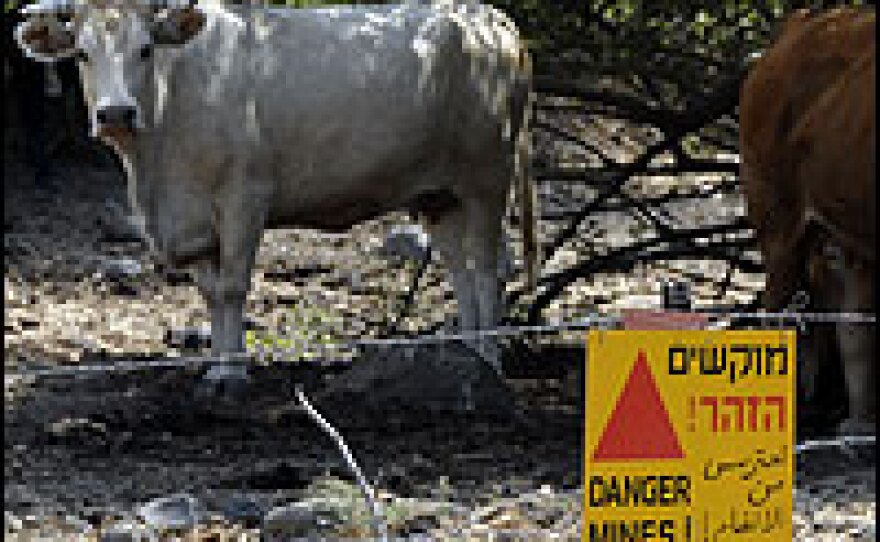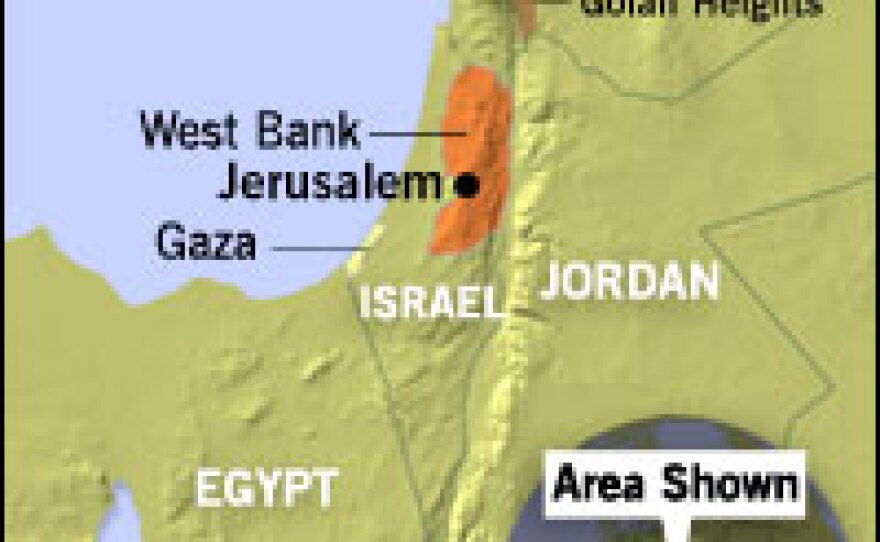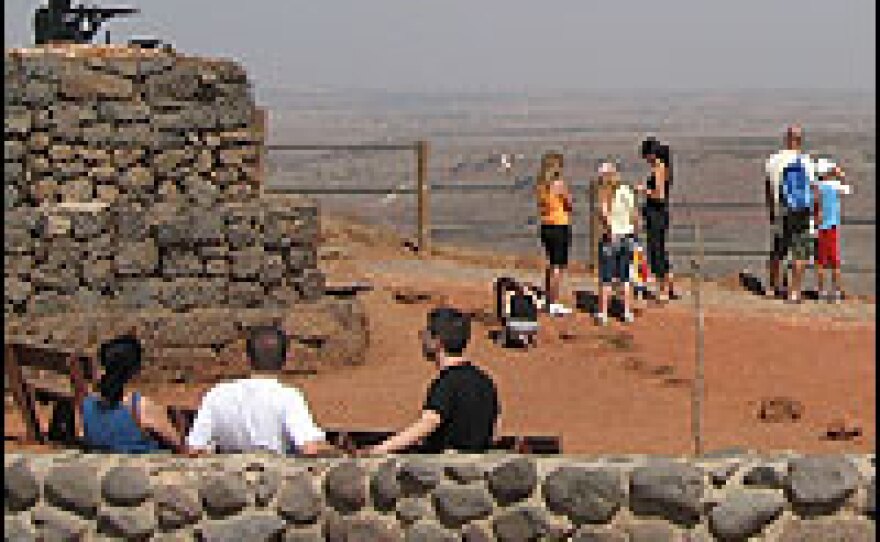

Tensions between Israel and Syria mounted last month in the wake of a still unexplained Israeli air strike in Syria.
This attack — and increased Israeli military exercises in the occupied Golan Heights — are sparking jitters along the border.
Since the 1973 Yom Kippur War, the Golan has been one of the Middle East's quietest borders. But last summer's inconclusive war in neighboring Lebanon sparked new concerns in the area.
And just days ago, again on Yom Kippur, locals tending their vineyards and orchards were rattled by the sound of Israeli fighter jets over the Golan. A Syrian MIG had suddenly disappeared from Israeli radar, prompting Israel to scramble planes in response.
'People were Scared'
A former Israeli military bunker atop Mount Bental overlooks the shattered Syrian city of Quinetra. It is now a tourist attraction, complete with a restaurant and gift shop.
Kids clutch ice cream cones and play in the trenches of the thick, concrete redoubt, moving amid cut-out silhouettes of soldiers holding wooden rifles.
Thirty-six-year-old Waffeck Ajamay, a Druze rancher, says he was tending his cattle during the most recent incident.
"People were scared. We hadn't heard the sounds of fighter planes over the Golan for a very long time," Ajamay says. "I was out in the field and looked in the sky --and saw the airplanes and thought it was very odd. I was a little worried."
It turns out that the Syrian jet had simply crashed in an accident. The Israeli planes stood down. But then last Friday, Israel again scrambled planes after Syrian helicopters reportedly flew too close to the border area.
Tense Atmosphere in a Normally Quiet Place
The incidents underscore the still-tense atmosphere in the Golan, underneath the ordinary routines of this rural setting. These days, the rumble and dust from Israeli military trucks, tanks and equipment are ever-present.
Many locals say the region is experiencing the busiest military activity they've seen in a decade.
Gyora Chepelinski, 43, and his wife moved from Argentina to a kibbutz, or communal farm, on the Golan six years ago. They opened a small chocolate factory near the base of Mount Avital, which, on its peak, holds a key Israeli military post overlooking Syria.
"There is ... a sensation that something is happening," Chepelinski says. "You don't know exactly what, but it's very different from what happened here before the last summer's war."
Both Countries Gear Up
Many Israel Defense Force soldiers who are posted or train in the Golan agree. One IDF reserve soldier agreed to speak only on condition of anonymity.
"Now it's more tense than ever," the IDF soldier says. "So both sides are doing all the things that [are] supposed to make the other side feel not comfortable."
The soldier says he observed increased activity on the Syrian side of the border, up-close, during a recent month-long training exercise. He says construction projects, long visible on the Syrian side, have expanded in recent months.
"Lots [of] heavy machinery. It looks like civilian work, but civilian work — it's the same," the IDF soldier says. "I mean, if you dig out a trench for cables, it could be good against tanks [and] good for infantry. It looks like they are getting ready."
Israel Steps Up Military Activity
Israel has significantly increased its military activity in the Golan this year. After last summer's war with Hezbollah, Israel re-manned look-out posts in the area that had sat empty for years.
Israel also increased tank and infantry training exercises. Last week, the increase in activity prompted the commander of U.N. peacekeeping forces on the Golan to voice concern.
Austrian Maj. Gen. Wolfgang Jilke warned in an interview with the German news magazine Der Spiegel of a heightened risk of clashes breaking out — due to a big increase in Israeli military training along the 45-mile-long, U.N.-patrolled "buffer zone."
Israeli military spokeswoman Capt. Noa Meir says what the U.N. general sees is normal.
"It's no secret [that] we need to get our army back in shape after last summer," Meir says. "These exercise[s] are part of ongoing, routine training"
But the Israeli soldier says that the exercises are bigger and more robust and clear in their training mission.
"We have a big exercise on the Golan on going to Syria. You know, like breaking the tanks. How you call it? Defenses," the IDF soldier says. "There's lots more training with live fire and it's more intensive than before."
Syria's Response
In a BBC interview broadcast Monday, Syrian President Bashar al-Assad said that his country reserves the right to retaliate for last month's Israeli air strike in northern Syria.
But Assad hinted a military response was not imminent. He said the Israeli attack targeted a vacant military building. President al-Assad also said Syria would not attend the American-sponsored Middle East peace meeting in November unless it addresses the occupation of the Golan, seized by Israel 40 years ago.
Copyright 2022 NPR. To see more, visit https://www.npr.org. 9(MDAzMjM2NDYzMDEyMzc1Njk5NjAxNzY3OQ001))







